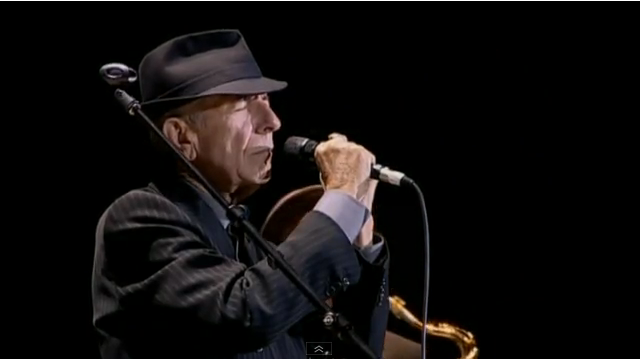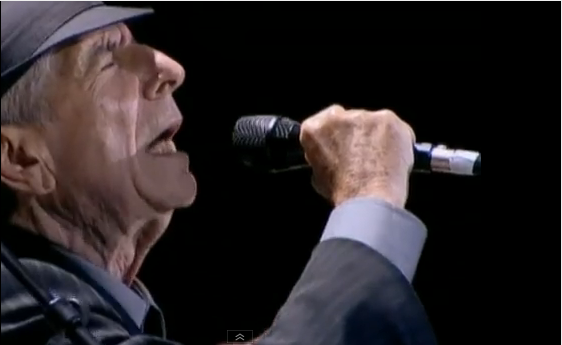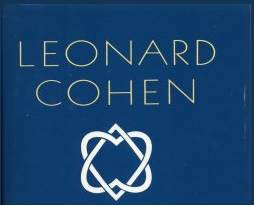 leonard cohen
leonard cohen  168 Comments
168 Comments Hallelujah By Leonard Cohen – Meanings And Thoughts
I divided this post into several sections, and in each one, I’m referring to a certain issue regarding “Hallelujah”.
What is the meaning of the word “Hallelujah”?
This word consists of two biblical Hebrew words:
- “Hallelu” – goes for “praise” in the plural, ‘all of you praise!’.
- “Jah” - is one of the biblical names of God (actually it is a short name of the tetragrammaton).
So those two words form the word “Hallelujah”, which means – ‘All of you praise the lord!’.
In Latin, it is pronounced “Alleluia“.
Leonard Cohen refers to the meaning of the word as “Glory to the Lord” or “Blessed is the name!”.
This word or phrase was used as a lead or an ending of a psalm – calling the present people to join the singer in praising the all mighty.
The singer began his singing in calling all surrounding people’s attention by calling a “Hallelujah”. Then he will proceed with the song itself and at the end, all the crowd together praises with him a “Hallelujah”.
This word occurs in the bible 25 times. All in the Book of Psalms which King David wrote.
A good example of the usage of the word is the last chapter of Psalms – psalms 150:
“Hallelujah.
Praise God in His sanctuary, praise him in the firmament of his power … Let everything that has breath praise the LORD.
Hallelujah“
(Cohen refers to that psalm in the song “Hallelujah”, saying: ‘and every breath we drew was hallelujah’.)
What is the song “Hallelujah” all about?
Leonard Cohen himself is trying over the years to understand, what made him write such a significant song.
Here are some quotes from Leonard Cohen that may shed some light on this question and give us some interesting perspectives about the meaning of this song:
“I wanted to get into this tradition of the composers who said “Hallelujah”, but with no precisely religious point of view.”
“It’s, as I say, a desire to affirm my faith in life, not in some formal religious way, but with enthusiasm, with emotion” (Leonard Cohen interview, 1985).
“I wanted to write something in the tradition of the hallelujah choruses but from a different point of view”(Leonard Cohen interview, 1995).
The traditional “Hallelujah” is an ancient word of prayer, used for expressing a person’s or a nation’s gratitude, love, and loyalty to their lord – calling out: “Let’s all praise the lord”.
Cohen wanted to be – in some way – a continuer of this tradition, although it would be independent of any religious framework. Cohen has a new way, a new meaning for the “Hallelujah”. He wants to call out his own “Hallelujah” to the Lord, to the world, and to life.
“There is a religious Hallelujah, but there are many other ones .When one looks at the world and his proper life there’s only one thing to say, it is ‘Hallelujah’ “.
“The Hallelujah, the David’s Hallelujah, was still a religious song. So I wanted to indicate that Hallelujah can come out of things that have nothing to do with religion”.
“And then I realize there is a Hallelujah more general that we speak to the world, to life”.
(Leonard Cohen interviews, 1985 – 1988)
This deep desire to speak our own life as a yearn coming up from in beneath our being and feeling – I think – is what led Leonard Cohen in writing this song.
Searching for the answer that can never be given – unless you “embrace it all”:
“The only moment that you can live here comfortably in these absolutely irreconcilable conflicts is in this moment when you embrace it all and you say: ‘Look, I don’t understand a fucking thing at all – Hallelujah!‘ That’s the only moment that we live here fully as human beings.”
Unless you :
“Open your mouth and you throw open your arms and you embrace the thing and you just say ‘Hallelujah!’ ,’Blessed is the name’ “
So how do we do that? How do we gain the ability to sing our own Hallelujah?
Let’s start simply by going over Hallelujah’s lyrics and trying to understand them:
Hallelujah lyrics explanation
Here are the full lyrics of “Hallelujah”. Click on any line of the lyrics to view its explanation:
Verse 1
I’ve heard there was a secret chord
That David played, and it pleased the Lord
But you don’t really care for music, do you?
The minor fall, the major lift
The baffled king composing Hallelujah
Verse 2
Your faith was strong but you needed proof
I’ve heard there was a secret chord
It is a “Secret Chord”, no one should know what was this chord, even though, in the further lines of this verse Cohen seems to specify the actual chords that David used for his Hallelujah, saying “It goes like that the fourth, the fifth…”, which may seem like an internal contradiction in Cohen’s words. But if we are aware of the context of this verse, we may find an explanation to this contradiction.
The poet is speaking to someone. Who is it? I suppose this is his female mate (as explained below). I believe he is trying find favor with her by saying something like that: “listen there’s something really special I can tell you… there’s a secret ancient chord I know… it was used by King David… “. But while saying that, he somehow falls into a kind of despair when he puts in mind that they do not share the same interest in music, and that his interest in music is disregarded by her. But although this is the situation, the poet continues to tell the story about King David’s Hallelujah, maybe because he feels that, in a certain way, it is also his own story.
That David played, and it pleased the Lord
King David used to play music since he was a boy, while he was watching over his father’s herd, and later on when he became King Saul’s personal minstrel and musician, and throughout his reign.
David was a talented instrument player and he could help Saul deal with his bad moods, and make him feel better.
“Whenever the harmful spirit from God came on Saul, David would take up his lyre and play. Then relief would come to Saul” (Samuel 1 16,23)
But beyond all of that, music had a very deep meaning in King David’s life, as one of the mediums of the search for the divine.
“In the night I shall call my song to remembrance, and with my heart I commune, my spirit inquires” (Psalms, 77, 6)
Leonard Cohen is trying to imagine those notes, which David used for getting to this inspirational state of mind and emotions.
But you don’t really care for music, do you?
To whom is Cohen addressing in this line? Who is “You”?
It seems to me like there’s a hidden argument along the song between Cohen and his female mate. Cohen feels she dose not really understand him and his desires.
You can call that the “Frame Story” of this song.
(As I mentioned earlier this song could be considered as a sort of an anthem of Leonard Cohen’s life.)
It goes like this
The speaker now envisions the sound of the “Secret Chord” he spoke about, at the beginning of this verse.
“It”, refers to the “secret chord”, although it isn’t only one chord, rather than a sequence of chords (which can also be referred to, as a “chord”, in the context of the scale they are played in, meaning that a certain progression of chords or notes within a given scale could be considered a “chord”).
We could also say that a “chord” here, is in the meaning of “Harmony”, and would describe an harmonious combination between several notes played one after each other.
The fourth, the fifth
This sequence of chords begins with the fourth and fifth chords or notes.
What do we mean by giving a number to a musical note?
The number we give it, actually describes it’s “position” inside a given musical scale (what musicians call a scale step or a scale degree).
For example in the C Major scale there are 7 notes: C, D, E, F, G, A, B. So the fourth and the fifth are the F and the G notes or chords.
What’s really interesting here, is that these are the actual chords that are played in this line of the song.
The minor fall, the major lift
This sequence continues with a “Minor fall”
Honestly, I really don’t know what is so special about this chord sequence…
The baffled king composing Hallelujah
This “baffled king” sits down to compose this powerful and invigorative hymn.
Why does Leonard Cohen refer to King David here as a “baffled king”?
I think that the reason is to make us or maybe even himself acknowledge, that King David was a human being, and that his life wasn’t perfect, he had a lot of mess in his life, nothing really went right along the way. And even though, he was the one to write the ‘Hallelujah’. That could be a very meaningful sign for Cohen himself, that he can also “get into this tradition of the composers who said ‘Hallelujah’ “.
Your faith was strong but you needed proof
In this verse, Cohen is actually speaking to King David himself.
King David’s faith and belief were indeed strong, but David wanted to be sure that God is “satisfied” by him, that God will “prove” him that he is a righteous man. This is called an ordeal, in which a man’s character is to be tested whether he is righteous or not.
As to ancient Hebrew commentary on the Bible, the story of Bathsheba was an ordeal from God, as explained here below.
You saw her bathing on the roof
In these lines, Cohen refers to the story about King David and Bathsheba…
It happened one late afternoon, “that David arose off his bed, and was walking around on the roof of the king’s house, and from the roof, he saw a woman bathes, and the woman was very beautiful to look upon” (2 Samuel 11,2).
Why would such a beautiful woman bathe in a place where other people can gaze at her? Did she mean to attract King David and make him take her?
According to a Talmudic commentary, Bathsheba was bathing on the roof inside some kind of a canopy with curtains. But the devil who is responsible for challenging humans, appears on one of the curtains of the canopy in the form of a bird, David – according to the Talmudical commentary – launches an arrow at that bird, and the arrow hits the curtain and pulls it up, and reveals Bathsheba to King David.
Her beauty and the moonlight overthrew you
Here there is a resemblance between the beauty of a woman and the luminescence of the moon.
As cited in Song of Songs(6,10):”Who is this woman that looks like the dawn, who is beautiful like the full moon…” .
The beauty of the woman strikes him like the bright light of a full moon. And he is knocked down and defeated by it.
She tied you to a kitchen chair
She broke your throne, she cut your hair
And from your lips, she drew the Hallelujah
You say I took the name in vain
I don’t even know the name
But if I did, well really, what’s it to you?
There’s a blaze of light
In every word
It doesn’t matter which you heard
The holy or the broken Hallelujah
I did my best, it wasn’t much
I couldn’t feel, so I tried to touch
I’ve told the truth, I didn’t come to fool you
And even though It all went wrong
I’ll stand before the Lord of Song
With nothing on my tongue but Hallelujah
Religious and sexual meanings of the song “Hallelujah”
When you go over Hallelujah’s lyrics you get the impression that this is a very religious and biblical influenced song, referring to King David, his spiritual music, and his relationship with the lord.
It tells about the mystical power of king David’s music(“A secret chord that David played and it pleased the lord”), the illumination a person can have from the words David sang to the lord (“There’s a blaze of light in every word”)
It also refers to some biblical stories such as King David and Bathsheba (“You saw her bathing on the roof”), Samson and Delilah (“She broke your throne and she cut your hair”).
In an interview on the CBC Television Cohen explains the linkage between sex and religion:
You can listen to it here:
“When I read your work and listen to your music sex and religion keep coming up again and again?
Leonard Cohen:
Those are the healing activities that are available for us. That’s how we make relationship; you know we do it in that whole large range of activities we call sex. Which is not only the copulation, it is the whole understanding that we are irresistibly attracted to one another and we have to deal with this, we are irresistibly lonely for each other, and we have to deal with this, we have to deal with our bodies and our hearts and souls and minds… it is an urgent appetite and it embraces the whole world it embraces all of us. And it is what we are doing all of the time.
And the other side of that, and it’s really the same activity, it’s just separated by a tiny membrane is the same appetite for significance in the cosmos, where each one of us understands his solitude in the cosmos and longs for some affirmation by the maker of the cosmos by the creator.
Leonard Cohen’s own reflections on “Hallelujah”
Thank you very much, friends. You know, since I’ve been here, many people have asked me what I have thought just about everything there is in this veil of tears. I don’t know the answers to anything.
I just come here to sing you these songs that have been inspired by something that I hope is deeper and bigger than myself. I have nothing to say about the way that Poland is governed. I have nothing to say about the resistance to the government. The relationship between a people and its government is an intimate thing. It is not for a stranger to comment.
I know that there’s an eye that watches all of us. There is a judgment that weighs everything we do.
And before this great force which is greater than any government, I stand in awe and I kneel in respect. And it is to this great judgment,
that I dedicate this next song: “Hallelujah”.
(1985 Concert in Warsaw, Poland)
You know, I wrote this song a couple of… it seems like yesterday but I guess it was
five or six years ago and it had a chorus called Hallelujah.
And it was a song that had references to the Bible in it, although these references
became more and more remote as the song went from beginning to the end.
And finally, I understood that it was not necessary to refer to the Bible anymore.
And I rewrote this song. This is the “Secular Hallelujah”.
(1988 Concert in Antwerp, Belgium)
The word Hallelujah of course is so rich, it’s so abundant in resonances… You know…
It is a wonderful word to sing and people have been singing that word for thousands of years.
It seems to call down some kind of beneficial energy just when you declare in the face of
the kind of catastrophes that are manifesting everywhere just to say: “Hallelujah”.
To praise the energy that manifests both as good and evil, just to affirm our little journey here.
It is very invigorating to sing that word.
(2014 Interview in London)


